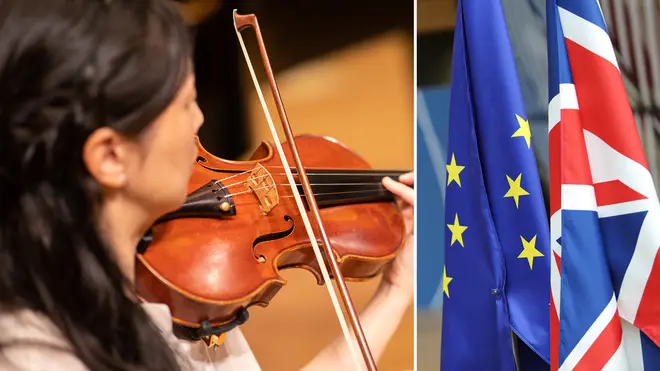‘Era of being a UK-based concert artist is pretty much over’ – musicians share their Brexit realities
18 May 2021, 15:39

Musicians and music businesses warn of ‘time up’ for UK grassroots acts, and European orchestras being resistant to booking UK artists because of ‘paperwork and expense’.
On Sunday, Sir Simon Rattle warned the London Symphony Orchestra will “fail” if ministers do not help ease post-Brexit touring rules in Europe.
Barriers to music tours include “even very basic things”, the conductor says.
“It’s all so obviously ludicrous, even in the area of haulage regulations,” Sir Simon told The Observer. “Touring concerts have to be planned in a different way – the truck has to return to England after two venues – we cannot go from one country to another.”
Now, 94 percent of respondents to a new survey by Incorporated Society of Musicians, ‘The impact of the Brexit Trade Deal on music businesses: The first 100 days’, have said the deal has had a negative impact on music businesses.
“Most European promoters, [including] orchestras, now do not want to book UK artists as it will involve too much paperwork and expense,” one respondent said.
Another warned the uncertainty and red tape “will cause British artists to miss vital and valuable opportunities in the EU”.
Read more: ‘Brexit deal will destroy our industry’ – musicians plead government on visas

Simon Rattle conducts the LSO in London's Trafalgar Square
‘Angry and betrayed’
One respondent said they felt “angry and betrayed” by the government, adding that ministers have “no clue about the music business, its value, its importance”.
In January, high-profile musicians including Sir Elton John and violinist Nicola Benedetti condemned the government for failing to preserve visa-free touring for UK musicians after Brexit.
Ministers have said it has been a “huge source of regret” that the EU rejected the UK’s proposals, which the EU has denied.
It comes as no surprise that musicians’ work opportunities have been impacted by touring visas and paperwork – an ISM survey found 43 percent of music sector workers travelled to the EU more than five times a year for work.
In March, minister Caroline Dinenage pledged to “streamline systems” for touring musicians and said the Department for Culture, Media and Sport (DCMS) is fighting for financial support for the arts.
Responding to the survey, one musician said they have “had no real guidance from the government”.
Another agreed: “It’s non-existent. I’ve been referred to foreign consulates for most issues.”

Beethoven Symphony No 9 Flashmob in Nuremberg, Germany.
‘I may have to abandon my UK artists’
One survey respondent, who runs a Europe-based tour operating company, said: “If it doesn’t improve then I am deeply concerned about whether I can remain profitable and will be able to carry on. I may have to abandon my UK artists.”
Another warned: “It’s not viable for a small business like us to pay for all the hassle of performing in Europe.”
Instrument manufacturers and retailers, as well as those involved in recording, music publishing and sale of music, have warned relationships with EU businesses are crumbling.
One respondent told the ISM that EU-based businesses are “refusing to trade with the UK because of the new paperwork and admin”.
Read more: Lord report says Post-Brexit touring ‘prohibitively expensive’ for musicians

Let Music Live protest on London's Parliament Square
‘Cabotage rules absolutely kill touring completely’
Respondents have warned small ensembles and grassroots acts will be more deeply affected by additional costs and cabotage rules, which mean a touring truck is only allowed to visit two EU countries before returning to the UK.
“Cabotage rules absolutely kill touring completely,” one respondent said. “It hugely impacts the smaller acts who don’t use trucks.”
Another said they “cannot see how a UK orchestra can tour through Europe… while complying with the cabotage limits.”
A third music business said: “It is our opinion that grass root acts will be unable to afford the additional costs.”
Read ‘The impact of the Brexit Trade Deal on music businesses: The first 100 days’ at ISM.org.


































